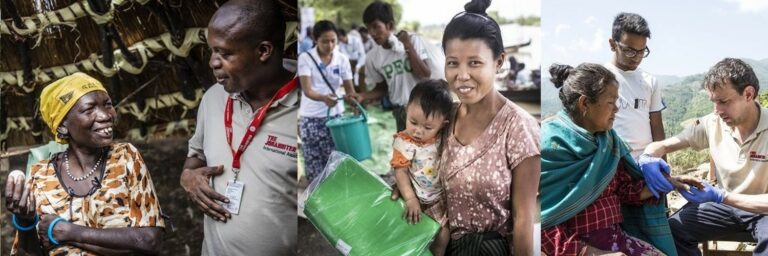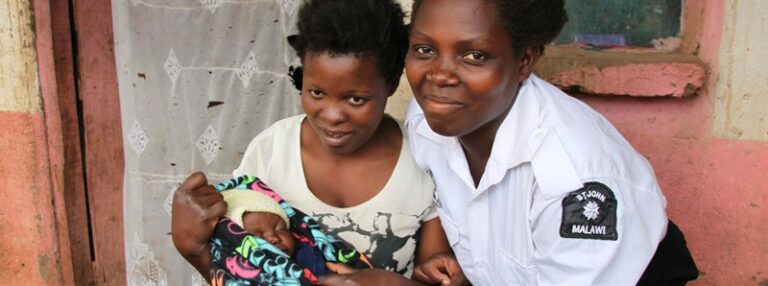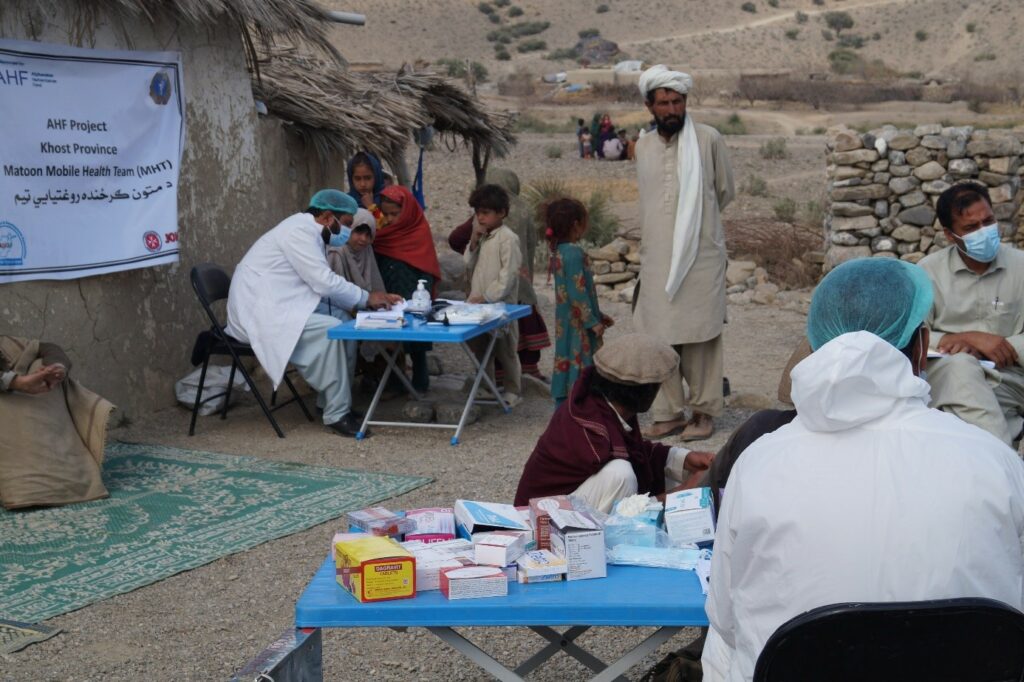Our member organisations are involved in international humanitarian aid, providing disaster relief and disaster preparedness through cooperation wherever needed.
Johanniter International Assistance focuses on the areas of health, water and hygiene, combating malnourishment, food and income security, securing survival and resilience. Through their international humanitarian work, they provide primary health care, medical disaster relief and prevention and the rehabilitation of people with disabilities.

The number and extent of natural disasters have been increasing worldwide during the last decades. The consequences of climate change such as floods, earthquakes, seaquakes, and storms create measurably less damage in industrialised countries, with functioning disaster preparedness and early warning systems, than they do in lower-income countries. The losses and damage can often take on devastating proportions when a natural disaster hits a country that is already burdened by crisis or war.
Fast responses after a catastrophe save lives, and efficient disaster preparedness structures also protect lives in the long term. Johanniter is committed to both disaster response and preparedness, trying to combine both areas in 75 projects in 16 countries. With the support of local 55 partner organisations worldwide, they ensure lasting impacts.
The core fields of action are immediate emergency response, health care and securing livelihood. Johanniter may also provide nutritional supplements, emergency shelters and non-food items such as blankets, kitchen tools and hygiene kits when basic health maintenance is required for the affected population.
Response work encompasses all the essential measures needed to help survivors or to meet the acute basic humanitarian needs of victims following a catastrophe. It involves a short reaction time, as well as a time-limited intervention.
Disaster preparedness encompasses all measures which can be taken before a natural catastrophe, in order to minimise potential damage. Prevention measures range from securing large infrastructure, such as quake-proof buildings, to the ability of services and communities to deal with a disaster when it strikes.
Preparation for potential disasters always plays a foremost role in projects run by Johanniter. This includes the establishment or reinforcement of the national disaster preparedness scheme, infrastructure creation and first aid for the local population.
Not only Johanniter International assistance provides disaster response and is active in the area of disaster preparedness, but also the Order of St John runs a disaster preparedness programme in the Caribbean. Through their programmes, they link local communities to national health services and increase community resilience. The Caribbean island states are classified as vulnerable due to the effects of climate change and natural disasters such as tropical storms. In the Caribbean, the Order of St John trains volunteers in workshops which includes basic awareness of different types of disaster, how to identify and reduce risk from hazards, reducing vulnerability of people and property, making an emergency evacuation plan, basic emergency first aid skills and effective early warning systems.
Each year, the organisations of the Order of St John train more than 2 million people in first aid and other healthcare activities, treat over 1.2 million people worldwide and reach more than 2.5 million beneficiaries with their services.
The Order of St John is active in over 30 countries worldwide, providing community-based first aid promoting health and well-being and delivering healthcare and support services.
The Mother and Baby programme is one of their most successful and growing support actions. The programme operates in Malawi, Uganda, Zambia and Zimbabwe, countries where maternal and infant death rates are high. In 2020, the Order of St John provided lifesaving advice and friendly, local community support to 8,301 pregnant women, 6,267 new mothers, and 6,398 husbands and partners. Within the programme, St John volunteers reach out regularly to the communities they serve, and in 2020 they ran education lessons for 115,527 people. This was done through the dedicated hard work of 380 volunteers, who also facilitated their local health service to provide 35,507 clinical consultations in the communities. Together they make it possible for pregnant women to get regular medical check-ups and give families advice on how to be properly prepared with a birthing plan.

For decades, Africa has seen the life expectancy of its populations stunted by communicable and parasitical diseases and increasing rates of non-communicable lifestyle diseases.
The healthcare challenges are heightened by the sheer diversity of the continent. Countries range from the resource-rich to the impoverished, from those with dynamic economies to those where conflict zones still simmer; they encompass large cities, remote villages and nomadic lands. Nonetheless, there is still a large percentage of people who have limited access to sufficient and quality healthcare. Operating in 11 African countries, St John is working to bring healthcare closer to those that need it the most, from saving the lives of mothers and their babies in countries with some of the highest child and maternal mortality rates to providing eye care to almost 25,000 people who might otherwise go blind.
In the Asia Pacific region, epidemics and disasters threaten hundreds of millions of people each year in this region, and the gap in health inequalities in some rapidly developing countries are growing rather than shrinking.
St John’s work in Asia Pacific stretches across not only the largest region in the world but also the most culturally diverse. From Singapore in the west to Fiji in the east, the Asia Pacific Region stretches almost 8,000 miles/ 12,000 km. In a region prone to natural disasters, Asia Pacific volunteers include preparation planning for disasters in their community support. Many have provided support at times of crisis to their communities. The work provided by St John also ranges from free dental care for disabled people in Hong Kong to dialysis centres in Malaysia.
Besides their first aid training and disaster preparedness in the Caribbean, the Order of St John‘s work in the Americas encompasses volunteer corps supporting military veterans in activities like the wheelchair regatta in the USA and highly innovative therapy dog programmes in Canada.
In many countries, refugees need humanitarian assistance. In countries such as Syria, Afghanistan, Colombia, the Democratic Republic of Congo, Pakistan or South Sudan, people are fleeing violence, hunger or poverty on a daily basis.

In Afghanistan, Johanniter International Assistance provides medical and psychosocial assistance to internally displaced persons and refugees from Pakistan. Tens of thousands of people have fled violence and fighting across the border. Many of them are traumatised by what they have experienced in their country and during their flight.
In Colombia, serious human rights violations during decades of armed conflict have forced hundreds of thousands of people to flee within their own country. Together with the local partner organisation, Johanniter International Assistance has provided kindergarten and work schemes for parents to support displaced families.
In December 2013, violent conflicts erupted in South Sudan. More than two million persons have so far been driven from their homes, many of them fleeing across the border into Kenya. Johanniter International Assistance provides support to 24 health centres in the south of South Sudan. In Kenya, Health Centers in the refugee camp of Kakuma receive medical support. The primary focus is put on maternal and child health to improve the situation of pregnant women and children. Additionally, mobile eye clinics, dental clinics and orthopaedic clinics are provided.
Johanniter International Assistance has been active in South Sudan since 2012. Their activities focus on providing medical care for pregnant women, mothers and their newborns in the western part of the country. Johanniter aims to improve health care and the condition of the population in the long term and from birth. For this reason, they are building maternity wards in coordination with local stakeholders and treating malnutrition and undernourishment in children and pregnant and lactating women. To this end, they have been maintaining a stabilisation centre in the refugee camp in the town of Wau since 2017.
Johanniter International Assistance provided support to numerous health facilities with primary health care across the country. In addition, a project focuses on the treatment of survivors of sexual violence, HIV patients, pregnant women and newborns, malnourished and undernourished patients, as well as people with disabilities.
Since the outbreak of the civil war in 2011, more than half of all Syrians have been forced to flee. Around 7.6 million people are displaced within Syria, and almost four million have sought refuge in neighbouring countries. Since 2012, Johanniter International Assistance has helped refugees fleeing violence in Syria to neighbouring Lebanon and Jordan, with support such as distribution of non-food items and psychosocial support. More than 160,000 refugees have directly benefited from the activities led by our German JOIN member.
The civil war in Syria created an additional need for relief goods, hygiene kits, food parcels and cash assistance. The context of the crisis is constantly changing and with it the needs of the target population. Since 2016, Johanniter International Assistance has focused increasingly on providing assistance to traumatised refugee children. In this regard, child-friendly spaces have been set up where children can learn and play again, and psychosocial support is offered to women and children. Follow this link to get more information on Johanniter’s aid to Syrian refugees.
The St John of Jerusalem Eye Hospital Group launched a project in partnership with the United Nations Relief and Works Agency for Palestine Refugees (UNRWA) to establish a Diabetic Screening Programme in northern Jordan. Thousands of refugees who have been forced to flee Syria were the beneficiaries. This was the first time our JOIN member from Jerusalem projected services into a neighbouring country.
Other ongoing support projects are led by our national members, such as the Association des Œuvres de Saint-Jean that provide logistics for the transport of insulin to Madagascar in collaboration with a non-profit organisation that runs a clinic for diabetes treatment and health centre in Madagascar. Our Austrian member participated in the Weihnachtstrucker project in cooperation with Johanniter Germany, wherein Christmas parcels are provided by donators and distributed to people in need in Rumania and other eastern regions. Beyond their national work, most of our member organisations financially support international humanitarian aid projects related to their joint services.
| Cookie | Duration | Description |
|---|---|---|
| cookielawinfo-checbox-analytics | 11 months | This cookie is set by GDPR Cookie Consent plugin. The cookie is used to store the user consent for the cookies in the category "Analytics". |
| cookielawinfo-checbox-functional | 11 months | The cookie is set by GDPR cookie consent to record the user consent for the cookies in the category "Functional". |
| cookielawinfo-checbox-others | 11 months | This cookie is set by GDPR Cookie Consent plugin. The cookie is used to store the user consent for the cookies in the category "Other. |
| cookielawinfo-checkbox-necessary | 11 months | This cookie is set by GDPR Cookie Consent plugin. The cookies is used to store the user consent for the cookies in the category "Necessary". |
| cookielawinfo-checkbox-performance | 11 months | This cookie is set by GDPR Cookie Consent plugin. The cookie is used to store the user consent for the cookies in the category "Performance". |
| viewed_cookie_policy | 11 months | The cookie is set by the GDPR Cookie Consent plugin and is used to store whether or not user has consented to the use of cookies. It does not store any personal data. |